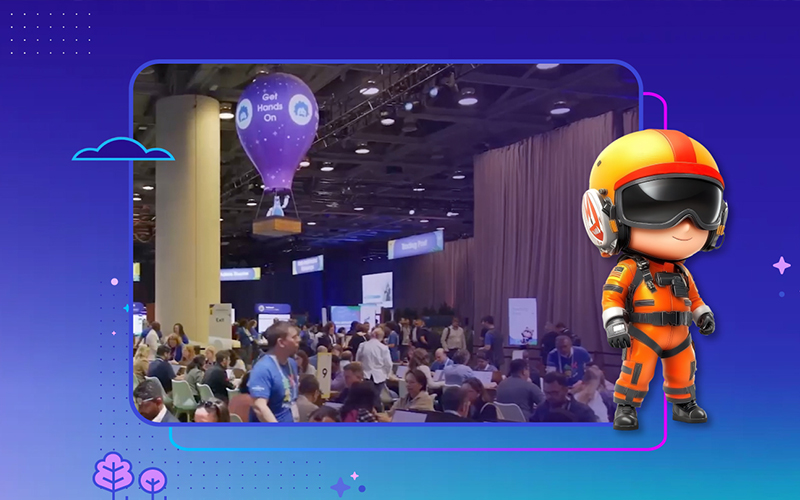
For the past 12 years, I’ve been working in the IT space. As part of my journey, I have had the privilege of working in India, Canada, and now in the US. I worked for various companies such as IBM India, IBM Canada, Georgia Pacific, and Comity before joining CodeScience.
I have been in the Salesforce ecosystem since 2015. As a Product Manager/Functional Architect, I have helped customers (such as ServiceSource, Invesco, Cisco, and Safe Light) launch their AppExchange Products. Over my years of experience, I’ve found that for many clients, it is always helpful to have 101 material available. While long-time readers of our blog may have deep expertise within the industry, there are many learning the platform for the first time.
I’ve written this blog to outline how I typically walk my clients who are new to the ecosystem through what Salesforce is, does, and how this all ties back to the AppExchange.
What is Salesforce?
Salesforce is a customer success platform, designed to help you sell, service, market, analyze, and connect with your customers. It has everything you need to run your business from anywhere. Using standard products and features, you can manage relationships with prospects and customers, collaborate and engage with employees and partners, and store your data securely in the cloud.
What Does Salesforce Do for You?
If you’ve been running your business from multiple systems, your customer data likely lives in different places. You might have data in emails, spreadsheets, various databases, or point solutions. Multiple systems are a barrier to understanding your data in aggregate and getting a complete picture of your customers. With your data in Salesforce, you have a single source of truth and a single point of engagement.
Salesforce’s technology is a game-changer. It’s a single place to create, view, and update your customer data from anywhere on any device to drive lasting engagement with your customers.
Industries and How They Align with Salesforce
Salesforce is a world-class Customer Relationship Management (CRM) solution that caters for different types of industries. Each industry Cloud is created with the features and tools specific to the industry.
Banking, Insurance, and Financial – Financial Services Cloud connects companies across their lines of business, geographies, and channels. From retail banking to wealth management to insurance, 360-degree visibility into your clients’ financial profiles puts them at the center of every interaction.
Communication, Consumer goods – In today’s market, it’s not just the size of your network or the speed of your bandwidth that wins new customers. To keep winning, you need to deliver the best overall customer experience. This solution combines three powerful Salesforce innovations: Marketing Cloud lets you personalize every marketing interaction, while Sales Cloud increases prospect conversion, and Einstein optimizes every touch at every stage of the sale.
Government – Salesforce Government Cloud helps Federal, State and Local Government Contractors and Defense agencies to be more transparent, simple, and successful in fulfilling mission obligations.
Healthcare and Life Sciences – Health Cloud puts patient satisfaction at the heart of every interaction. In today’s world, patient expectations of customer service are changing. As a healthcare provider’s first point of interaction, contact centers can make or break the patient experience. Health Cloud combines relevant patient data from different systems into a single view, with intelligent routing and recommendations, to ensure agents connect patients to the right care faster.
Manufacturing – Salesforce empowers the company’s channel partners by providing complete personalized partner portals, apps, and workflows built on the Lightning Platform thus making it easy for the manufacturers to collaborate with the dealers and distributors on sales, service, marketing, and more. Now, any company can work with its partners through partner communities and leverage the power of Sales Cloud and Configure-Price-Quote.
Media – Bridging the gap between the content you make, and the fans who consume it, is the key to marketing. Moreover, you cannot miss content that drives more revenue. The solution – which is a combination of Salesforce Data Management, Marketing Cloud, and Community Cloud – creates personalized 1:1 marketing journeys, enriches audience insights, and boosts ROI.
Travel and Hospitality – With Marketing Cloud, Service Cloud, and Salesforce Communities, Salesforce helps this industry in finding new prospects, serving them well by responding to any cases/issues that were raised as well as building loyalty. This solution elevates the entire travel experience by letting you deliver personalized messages that inspire trips, provide relevant recommendations based on location and preferences, and deliver engaging content to the travel community through a world-class app.
What is the AppExchange?
The AppExchange is your marketplace for all things Salesforce, including apps, Lightning components, and more. There are thousands of applications available on the AppExchange – both free and paid. These applications span across many industries and provide solutions to a myriad of business problems. As you are evaluating the AppExchange, it is important to understand what is available to customers already. For business success, you must understand what makes your application unique and how it fills the white space in the ecosystem – there is a tremendous opportunity for nearly every business across every vertical.
Salesforce has over 150,000 customers, most of whom use AppExchange apps. Based on the latest numbers from Salesforce, 89% of their Fortune 100 customers have at least one application installed, and the number of installed applications is over 6 million..
How to Install AppExchange Apps
AppExchange solutions are delivered to your org in packages.
A package is a container for something as small as an individual component or as large as a set of related apps (which are containers for apps, tabs, and objects). After creating a package, you can distribute it to other Salesforce users and organizations, including those outside your company.
Packages come in two flavors: 1. Unmanaged 2. Managed.
Unmanaged – Unmanaged packages are like open-source projects or applications templates to provide developers with the basic building blocks for an application. This means the components within a package are editable, customizable, and can be extended as desired by the developer or consumer. The developer who created and uploaded the unmanaged package has no control over the installed components and can’t change or upgrade them.
Managed – Managed packages are typically used by Salesforce partners to distribute and sell applications to customers. These packages must be created from a Developer Edition org. Using the AppExchange and the License Management Application (LMA), developers can sell and manage user-based licenses to the app. Managed packages are also fully upgradeable. To ensure seamless upgrades, certain destructive changes, such as removing objects or fields, cannot be performed. Managed packages also offer the following benefits:
- Intellectual property protection for Apex
- Built-in versioning support for API accessible components
- The ability to branch and patch a previous version
- The ability to seamlessly push patch updates to subscribers
- Unique naming of all components to ensure conflict-free installs

This table shows the main differences between managed and unmanaged packages.
Who Develops These Apps?
Before we go deep into who develops apps on AppExchange, let’s talk about some of the keywords you’ll hear in your day-to-day Salesforce world.
Salesforce strongly believes in building healthy partnerships.
Partnerships come in two flavors: 1. AppExchange Partner 2. Consulting Partner.
AppExchange Partner – Also called an ISV (Independent Software Vendor). These are the companies who have an idea for a commercial product that they want to sell on the AppExchange. These solutions range from software development building blocks, such as Lightning components, to full-fledged apps that run on the Salesforce platform and use external services.
Consulting Partner – Consulting partners market their Salesforce expertise to clients who need help with software migration, systems integration, or custom apps. They demonstrate this expertise by keeping their Salesforce certifications up-to-date and assembling portfolios (or success stories) of successful projects.
Then, what is a PDO?
At the highest level, PDO, or Product Development Organization, have focused expertise in building commercial applications. This differs from other consulting partners in that PDOs have the knowledge of how to build applications that scale. There is a fundamental difference between customizing a single instance of Salesforce versus creating something that can install on thousands of organizations. For a more detailed explanation, check out the link above.
Can All Consulting Partners be Called PDOs?
The answer is NO. To maintain eligibility as a PDO Partner, you need to remain in good standing as a Salesforce Consulting partner.
Consulting partners are evaluated across a range of core attributes including Salesforce Certifications, Specializations, Customer Satisfaction (CSAT), and Customer Success Stories.
Consulting partners who wish to differentiate themselves as having extensive experience with AppExchange Partner applications can pursue PDO Specializations and earn a Master Navigator designation.
REMEMBER – Consulting partners are only considered a PDO once they have achieved all of the required PDO Specializations.
Security Review
You CANNOT launch on the AppExchange unless you pass security review.
The number one value at Salesforce is Security and Trust. Salesforce changed the business world by convincing enterprise customers to store their data in the cloud. It was a tough sell at first because many of these customers worried about the security of their data. But after years of innovating, building customer trust, and succeeding time and again, Salesforce proved that cloud computing is the best business platform.
Salesforce customers purchase on a subscription model. If they can’t trust us – and you – to secure their data, they have no reason to stick around!
To ensure the app built does not have any holes in security and will protect the customer’s data, Salesforce’s security team conducts rigorous reviews of all products before approving it for listing on the AppExchange.
For AppExchange partners, passing the security review takes planning and effort. A passing grade demonstrates your commitment to your customers and adds real value to your product. Customers know that any offering on AppExchange provides the highest level of protection for their data.
The Salesforce security review focuses on an app’s vulnerability to the most common attacks. This involves not only your code, but also any applications (web, mobile, and desktop) that your app integrates with. The Product Security team try their hardest to gain access to the precious data within your product. If they can’t break in, you pass the review!
If you’d like to learn more about the AppExchange and some of the nuances around each of these sections, check out our Beginner’s Guide to the AppExchange – this free resource explores the business opportunity within Salesforce as well as showcasing the process and roles around each stage of the journey.
CodeScience has brought over 220 commercial applications to market and is the first and only Master Navigator PDO. If you’re ready to thrive on the AppExchange, get in touch today!


